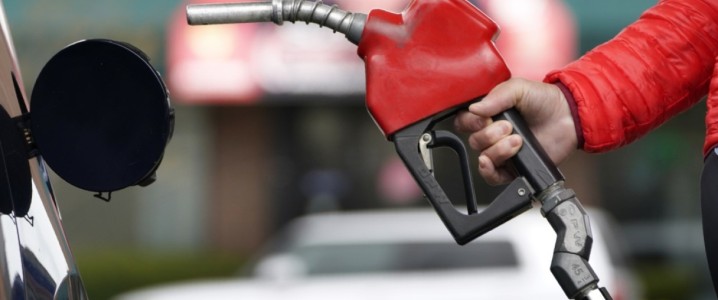Business
U.S. Gas Prices Expected to Fall Below $3 This Summer

U.S. gasoline prices are on track to decline below $3 per gallon this summer, a significant milestone not seen in over four years. Various factors, including increased imports and reduced demand due to adverse weather conditions, are contributing to this expected price drop. The national average price currently stands at $3.15 per gallon, marking the lowest level recorded during summer months since 2019.
Many drivers are already experiencing gas prices below $3, with reports indicating that most motorists are paying around $2.99 per gallon, while some are even finding prices as low as $2.79. The median price across the country is currently $2.97 per gallon. In stark contrast, residents in states like California ($4.49), Hawaii ($4.47), and Washington ($4.41) are facing some of the highest prices in the nation.
According to GasBuddy, the top 10% of gas stations are selling gasoline at around $4.34 per gallon, nearly double the price at the lowest 10% of stations, which are selling gas for about $2.54 per gallon. Diesel prices also reflect a similar trend, with the average price at $3.49 per gallon, and the median at $3.59 per gallon. The top 10% of stations report diesel prices at $4.63 per gallon compared to an average of $3.07 for the bottom tier of stations.
Despite the lower prices, recent data indicates a decline in fuel demand. The U.S. Energy Information Administration (EIA) reported that gasoline consumption dropped by 2.5% year-on-year in the week ending July 4. This decline is particularly concerning as it occurs during a peak travel season. Fuel demand, measured by gasoline products supplied, averaged 9.2 million barrels per day over the past four weeks, reflecting a 1% year-on-year decrease.
Extreme heat this summer has been linked to falling demand, as high temperatures discourage driving. Traditionally, summer is a time when driving increases significantly in the United States. However, changes in driving habits, particularly the rise in remote work, have contributed to a long-term decline in gasoline consumption. Consumption has not returned to its peak of over 9.3 million barrels per day seen in 2018.
As Patrick De Haan, head of petroleum analysis at GasBuddy, noted, the landscape of fuel consumption is evolving. The growing popularity of electric vehicles (EVs) is increasingly impacting oil demand, with estimates suggesting that EVs currently displace about 3.5 million barrels of oil per day worldwide. This trend is especially prominent in the U.S., where the adoption of EVs is accelerating.
The International Energy Agency (IEA) recently projected that the global EV fleet will displace over 5 million barrels per day of crude oil by 2030, with significant growth expected in markets like China, Europe, and the U.S. Last year, the global EV fleet reached 58 million vehicles, more than tripling over the past four years. EVs now make up approximately 4% of the global passenger car fleet.
Norway leads the way in EV adoption in Europe, with 88% of new cars sold in 2024 being fully electric. This shift has resulted in a 12% decline in Norway’s oil demand from 2021 to 2024. As a major supplier of natural gas to Europe, Norway has consistently ranked among the top providers of gas to the European Union, supplying 52.6% of the EU’s natural gas imports in the first quarter of 2025.
As U.S. motorists prepare for a summer of lower gas prices, the broader implications of changing fuel consumption habits and the rise of electric vehicles will continue to shape the energy landscape.
-

 World5 months ago
World5 months agoSBI Announces QIP Floor Price at ₹811.05 Per Share
-

 Lifestyle5 months ago
Lifestyle5 months agoCept Unveils ₹3.1 Crore Urban Mobility Plan for Sustainable Growth
-

 Science4 months ago
Science4 months agoNew Blood Group Discovered in South Indian Woman at Rotary Centre
-

 World5 months ago
World5 months agoTorrential Rains Cause Flash Flooding in New York and New Jersey
-

 Top Stories5 months ago
Top Stories5 months agoKonkani Cultural Organisation to Host Pearl Jubilee in Abu Dhabi
-

 Sports4 months ago
Sports4 months agoBroad Advocates for Bowling Change Ahead of Final Test Against India
-

 Science5 months ago
Science5 months agoNothing Headphone 1 Review: A Bold Contender in Audio Design
-

 Top Stories5 months ago
Top Stories5 months agoAir India Crash Investigation Highlights Boeing Fuel Switch Concerns
-

 Business5 months ago
Business5 months agoIndian Stock Market Rebounds: Sensex and Nifty Rise After Four-Day Decline
-

 Sports4 months ago
Sports4 months agoCristian Totti Retires at 19: Pressure of Fame Takes Toll
-

 Politics5 months ago
Politics5 months agoAbandoned Doberman Finds New Home After Journey to Prague
-

 Top Stories5 months ago
Top Stories5 months agoPatna Bank Manager Abhishek Varun Found Dead in Well









